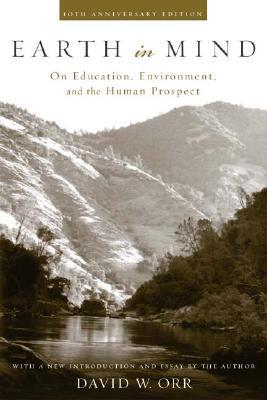What do you think?
Rate this book


221 pages, Paperback
First published January 1, 1994
Though written 20 years ago, this is forcing me to think more critically of place, choices and practices, and the connection to other communities. Responsibility needed.
Earth in Mind profiles the gradual annihilation of the planet caused by no-holds-barred economic progress, reliance on fossil fuels, unrestrained technological advancements, and other harmful forces of modernization whose costs are rarely calculated. It should be required reading for everyone, but especially the power brokers of our global society such as politicians, CEOs, financial analysts, education administrators, and scientific researchers.
Earth in Mind is an appropriate name for this collection of essays on the Earth and education. I'm lucky to have received the kind of ecological citizenship training touted by Orr from my family. I believe that it's not too late to make a united, systematic and sustained effort to educate our children to be biophiles and not biophobes so that they will become advocates for our planet and its inhabitants and pass on the love to future generations.
Excellent book! A must-read about the relationship between economy and ecology! Holistic, wholesome, a reminder of our own connection to Nature!
This book provoked me, worried me and confused me at times. It reinforced ideas but it also required me to rethink my ideals and approach to life.
For me, this book was both a practical and promising guide to how I will live and love in this — the sunset of my life. I loved this book. As a teacher, it will be on my great books list!
Earth in Mind is a great book for inspiring an intentional, genuine focus on environmental issues in higher education. I intended to encourage deeper consideration of the long-term consequences of our lifestyle among my students.
Earth in Mind evokes a feel of urgency to spring to action and take care of Mother Earth.
The author builds the case for incorporating the environment to all disciplines. I think this is a good book for all educators.
This book was a great reminder of our responsibility as higher ed faculty to introduce students to the idea of sustainability. If we don't get students to critically think about these issues then who will?
The plain fact is that the planet does not need more successful people. But it does desperately need more peacemakers, healers, restorers, storytellers, and lovers of every kind. It needs people of moral courage willing to join the fight to make the world habitable and humane. And these qualities have little to do with success as our culture has define it.